Unlock the Editor’s Digest for free
Roula Khalaf, Editor of the FT, selects her favourite stories in this weekly newsletter.
Oracle will spend about $40bn on Nvidia’s high-performance computer chips to power OpenAI’s new giant US data centre, as technology groups race to build the vast infrastructure needed to underpin artificial intelligence models.
The site in Abilene, Texas, has been billed as the first US Stargate project, the $500bn data centre scheme spearheaded by OpenAI and SoftBank, and will provide 1.2 gigawatts of power when it is completed next year, making it one of the largest in the world.
Oracle would purchase about 400,000 of Nvidia’s GB200 chips — its latest “superchip” for training and running AI systems — and lease the computing power to OpenAI, according to several people familiar with the matter.
The site’s owners, Crusoe and US investment firm Blue Owl Capital, have raised $15bn in debt and equity to finance the Abilene project, which will encompass eight buildings. Ground was broken on the site in June last year.
The data centre is expected to be fully operational by mid-2026. Oracle has agreed to lease the site for 15 years. Stargate, which incorporated earlier this year, has not invested in the site.
JPMorgan had provided the bulk of the debt financing across two loans totalling $9.6bn, according to people close to the matter, including a $7.1bn loan announced this week. Crusoe and Blue Owl have separately invested about $5bn in cash.
Once completed, its scale will rival plans by Elon Musk to expand his “Colossus” data centre in Memphis, Tennessee, to house about 1mn Nvidia chips. Much of the data centre has so far been built on Nvidia’s earlier H100 and H200 chips, which are less powerful. Musk said this week that the next phase of Colossus would be the “first Gigawatt AI training supercluster”. Amazon is building a data centre in northern Virginia that will be larger than 1GW.
The Abilene data centre is a crucial step in OpenAI’s move to reduce its dependence on Microsoft. Previously, the $300bn-start up has exclusively relied on the US software giant for its computing power, and a large chunk of Microsoft’s near-$14bn investment in OpenAI has come in the form of cloud computing credits.
OpenAI and Microsoft agreed to terminate their exclusivity agreement earlier this year after the start-up became frustrated that its demand for power far exceeded the US tech giant’s supply. The two groups are negotiating to determine how long Microsoft will retain licensing rights to OpenAI’s models.
Stargate will play a crucial role in providing OpenAI’s future computing power. The high-profile venture, billed as a huge infrastructure project to boost the US AI industry, is proposing to raise $100bn to spend on data centre projects, with that figure rising to as much as $500bn over the next four years.
OpenAI and SoftBank have each committed $18bn to Stargate, which was unveiled in January by US President Donald Trump. Oracle and MGX, an Abu Dhabi sovereign wealth fund, committed a further $7bn each, according to a person familiar with the matter.
The four groups would hold equity stakes in the project, with SoftBank and OpenAI the majority owners, according to a second person with knowledge of the matter. Stargate has not committed capital to any data centre project so far.
OpenAI has also expanded its Stargate project overseas, with plans to build a massive data centre in the UAE that was announced as part of Trump’s Gulf tour last week. The 10 sq mile UAE-US AI campus, located in Abu Dhabi and built by Emirati AI company G42, is planned to have 5GW of data centre power — equivalent to more than 2mn of AI chipmaker Nvidia’s latest generation of GB200 chips.
Oracle did not immediately respond to a request for comment. JPMorgan and OpenAI declined to comment.
